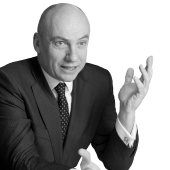But this is in contradiction with the nature of homo economicus. This person does worry about the environment. But in the long term, they will only change their behavior if it does not impact upon their standard of living. There is a greater propensity to adapt if there is an increase in income – if incentives exist to augment their wealth. The term sustainability follows the verb "to sustain," in the sense of “to achieve a lasting effect over a longer duration.” Accordingly, an entrepreneur acts sustainably if they ensure the profitability of the enterprise, thereby guaranteeing income over the longer term for themselves as well as for employees.
Even in the finance industry, when considering sustainability, many companies focus on environmental factors. Banks, for example, frequently point out in marketing material that they have greatly reduced their carbon footprint. But, in the wake of the financial crisis, it is important to strengthen sustainability in the original sense of the word. It is necessary for financial institutions, therefore, to increase productivity and consequently profitability in the long term for the benefit of all stakeholders, including clients, shareholders, employees, partners and suppliers from the region.
To achieve this, the product offering must be attractive, and simultaneously, the business structure must be lean and cost-efficient. All processes that can be automated must in future also be handled digitally. Regarding processes for which specialized vendors offer cheaper and better solutions in areas such as data cloud solutions and robo-advisory, there is no need for expensive proprietary in-house development. Financial service providers need to move away from producing their own resource-intensive software solutions to every problem. Banking secrecy can also be guaranteed on cloud and software-as-a-service solutions.
Fierce competition – above all the advances of passive investment instruments – has severely reduced margins in asset management in recent years. Advisory services previously offered to a client with assets of 500,000 francs are now only profitable for assets of at least five times that size. At this stage, only a handful of new offers have been launched that adequately cover the spectrum between retail clients and wealth management for high net worth clients. The close, personal handling which once defined private banking can no longer be justified by the banks for many wealthy customers considering present-day work processes.
A decisive factor in slowing down the change is resistance by well-paid private bankers, who fear for their position and income in a leaner organization. Internal IT departments often also struggle with unfamiliar models and new processes. Often prevailing is the opinion that their privileged positions can only be justified by maintaining the existing business model. In the longer term however, any bank sticking to its conservative business model will back itself into a corner. There is no guarantee that the next generation, the heirs of the managed assets, will equate a satisfactory banking relationship with “free” lunches and other thus far common wealth management practices.
The private banker must get on board with the digitization shift that has already been carried out by many in the current generations of heirs. It is not about self-purpose and image-building. Only through the deployment of the latest technical instruments is a client advisor able to offer customer service that is both tailored to the individual and competitively priced. In this manner, a larger number of customers can be served, without compromising on the care. Productivity as well as customer satisfaction are increased.
Suitable products, such as Robo-Advisory, Advisory Dashboard and Proposal Engine are ready for utilization either as a complete software-as-a-service solution by the client advisor, or as a hybrid solution allowing the client to access a shared platform.
The Swiss financial sector requires a rethink. The maintenance of the "status quo" remains a successful model despite setbacks. However, financial institutions do not necessarily have to give up the strengths of the Swiss Banking system – but rather to use them more efficiently. The use of suitable technologies would enable Swiss banks to become more transparent, sustainable and credible – while increasing profitability.

Martin Kull, Managing Director, Alpine and Eastern Europe at Orange Business, brings a wealth of experience and industry knowledge in digital transformation, leading IT and communication solutions, cloud software, mobility services and security. His strengths in leadership, team building, development and change, along with his focus on a strong partner eco-system, are manifested in flexible, action-oriented results. In his free time, he is an excellent cook and enjoys sailing and skiing.